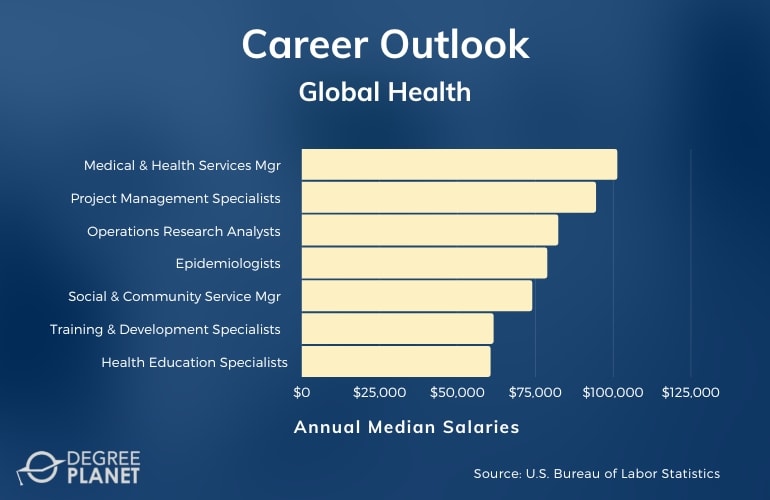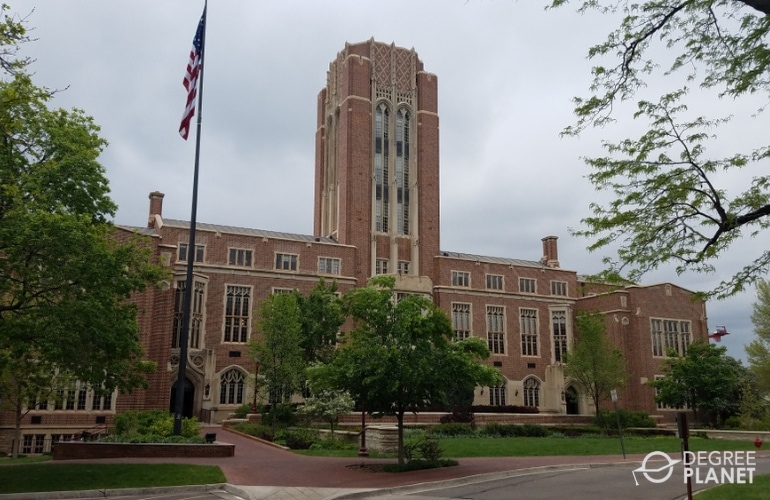If you’re passionate about improving the health and happiness of individuals and communities around the world, then you might consider earning a global health masters.

Professionals in this field have the opportunity to make an impact on health at a global level. This masters degree path could allow you to advance your professional qualifications in this rewarding field.
Editorial Listing ShortCode:
With diverse areas of international and interdisciplinary focus, this degree path could also lead to a range of opportunities in the growing health sphere.
Online Global Health Masters Programs

Global health online masters degree programs focus on health issues that transcend borders, races, cultures, and religions. These include topics such as epidemiology, mental illnesses, tropical diseases, and more.
Alongside these topics, you’ll study facets of a range of subjects in order to explore their relationship with and impact on global health. Some of these subjects may include:
- Nutrition
- Behavioral science
- Anthropology
- Health care management
- Demographics
- Policy
You can expect to dive into economic, social, and political structures to analyze and determine their impact on medical issues, access to healthcare, and disease spread. When studying the impact of policy on global health, you might explore the effects of political instability, war, immigration, and social unrest.
Editorial Listing ShortCode:
You may also analyze environmental and cultural factors and how they impact health outcomes in communities. In doing so, you can learn how to effectively conduct research and propose action plans to improve global health. For instance, when exploring the impact of environment on global health, you could study the effects of water shortages, pollution, deforestation, climate change, and more.
In global health master’s programs, you can expect to learn how to conduct effective field research and analyze cause and effect relationships. You may also be able to focus on a specific area of concentration in global health, such as economics and global health, environment and global health, or even finance and global health.
Global Health Careers & Salaries

Graduates with a masters in global health may find a diverse spectrum of career opportunities, depending on their passion and concentration.
Many graduates pursue careers working with various global health agencies. These include non-governmental organizations (NGOs), governmental agencies, international health organizations, disaster relief organizations, and more. Career opportunities in these sectors can include positions such as health policy advisor, health policy analyst, program developer, global health consultant, and data analyst, among others.
According to the Bureau of Labor Statistics, here are the median wages for positions related to the field of global health.
| Careers | Annual Median Salaries |
| Medical and Health Services Managers | $101,340 |
| Project Management Specialists | $94,500 |
| Operations Research Analysts | $82,360 |
| Epidemiologists | $78,830 |
| Social and Community Service Managers | $74,000 |
| Training and Development Specialists | $61,570 |
| Health Education Specialists | $60,600 |
| Survey Researchers | $59,740 |
| Social Science Research Assistants | $49,720 |
| Community Health Workers | $46,590 |
There is a rising demand for researchers who can analyze and compile large amounts of health data and transform them into programs and policies that shift global health. Many graduates also consider a variety of careers in research, health program management, epidemiology, and more.
Editorial Listing ShortCode:
Students in a global health masters program tend to already work in the healthcare field, either as administrators or practitioners. These professionals may expand their reach, skill sets, and impact with a graduate-level education in global health.
Global Health Masters Curriculum & Courses

Courses in global health master’s programs can vary depending on your school, but many contain similar coursework. Here are a few common courses you may encounter:
- Global Health Policy: This course focuses on examining health policies at a global level, and it also covers the integration of population data in global policy and strategy.
- Evolutionary Medicine and Global Health: This course explores current health challenges through an evolutionary biology lens, covering topics such as the coevolution of humans and pathogens, human diseases and migration, aging, and more.
- Medical Anthropology: This course overviews how health and illnesses are affected by culture and cultural values in the past and present.
- Reproductive Ecology: This course focuses on human reproduction and the social and ecological factors that influence reproduction and fertility.
- Maternal and Child Health: This course focuses on global contributions to maternal and child health, including clinical access, genetics, nutrition, policy, and cultural practices.
- Survey Topics in Global Nutrition: This course focuses on hands-on experience and analysis of research and policy relating to global nutrition topics, such as food systems, sanitization, and environmental systems.
- Migration, Asylum, and Refugees: This course overviews current policies and practices surrounding migration and refugee resettlement, with a focus on social justice.
- Food System Sustainability: This course overviews global food systems, with a heavy focus on sustainability.
- International Development and Sustainability: This course overviews theories of growth and development from a sustainability lens as well as the relationships between food, population growth, inequality, technology, and more.
- Program Evaluation and Information Management: The course helps you develop evaluation skills, and it covers topics such as data and information collection, analysis, data management, and more.
In addition to coursework, students are often required to complete a capstone project, thesis, or portfolio, alongside in-field experience.
Admissions Requirements

Admissions requirements for a global health masters program can vary depending upon your university. Yet, many have similar core requirements you may encounter, such as:
- Minimum college GPA of 3.0, on average
- CV or resume
- Official undergraduate transcripts
- Personal statement
- Letters of recommendation
Many schools no longer require GRE or GMAT scores for graduate admissions. You can check with your school to determine whether these are necessary to include in your application.
Accreditation

It’s essential to determine any prospective school’s accreditation status before applying. This is because accreditation can not only impact your eligibility to receive financial aid but also your employability in the future.
Editorial Listing ShortCode:
Regional accreditation is considered the most widely recognized and prestigious accreditation. In essence, it ensures a high standard of quality for colleges, regardless of whether your school is online or on campus. There are only a handful of regional accrediting organizations. You can verify that a school is accredited by a credible organization by visiting the website of the Council for Higher Education Accreditation (CHEA).
Financial Aid and Scholarships

Most students pursuing a global health masters online will need financial assistance. Luckily, there are several routes you can explore to try and secure financial aid.
One option is to consider scholarship and grant opportunities. Both scholarships and grants are available for all types of majors and specific life situations. You can apply to these opportunities individually in order to be considered. Another option is to look into federal aid and state aid programs. Student loans are the most common form of government aid.
Your eligibility for this type of aid can depend on your financial situation and state. You can apply for federal aid by filling out a Free Application for Federal Student Aid (FAFSA). You may also be able to seek out employer programs if you’re currently employed. Some employers provide assistance to employees who are looking to further their education.
What Is an MS in Global Health?

A Master of Science in Global Health is a graduate degree that aims to equip students with specialized knowledge and research skills to improve health at a global level. This degree focuses on health topics that transcend borders, such as infectious disease spread, environmental issues, and global policy factors.
Within this degree, you can be exposed to various disciplines as they relate to health, such as sociology, social justice, sustainability, and anthropology. This degree can help prepare students for a rewarding career making an impact in health at an international level through shaping policy and programs.
What Can You Do with a Masters in Global Health?

Career opportunities can be diverse for graduates with an online masters in global health, similar to the case with those with MPH / MHA dual degrees. Your chosen concentration and prior experience may help determine your career trajectory.
Some graduates go on to become health policy advisors, health policy analysts, program developers, global health consultants, data analysts, researchers, or global health educators. Experienced professionals may also pursue senior or leadership positions in the field.
Editorial Listing ShortCode:
Common employers include governmental agencies, international health organizations, disaster relief organizations, research and academic institutions, refugee health organizations, and more.
How Long Is a Global Health Master Program?

The length of online masters in global health programs can vary depending upon the school. Most masters programs can be completed in 1 to 2 years with full-time study.
If a program consists of 36 credit hours and has no thesis requirement, it can generally be completed in 1 year with full-time and year-round enrollment, including the summer term. Completing a thesis could add additional time to your program. Part-time enrollment could extend your time to completion as well. Some programs also require fieldwork or internships, which are typically included in the completion timeframe.
What’s the Difference Between a Masters in Public Health vs. Global Health?

A masters in public health and a masters in global health may have overlapping topics, but they differ in important ways.
- Masters in Public Health: This masters is more focused on health issues within a country, community, or specific population.
- Masters in Global Health: This masters has an international focus rather than a focus on specific local communities.
Both masters degrees may have some topics that overlap, but a global health masters is concerned with health factors that affect the entire world.
What’s the Difference Between a Master in Global Health vs. International Health?

International and global health are often used interchangeably, yet they are distinct in their scope.
- Master in Global Health: A masters in global health focuses on the health of the world, which transcends borders. It looks at help from an angle of equality, encompassing all regions and cultures, regardless of socioeconomic status.
- Master in International Health: This masters focuses on health issues in specific international countries. While it does share global concerns, it is more location-focused.
A masters in global health is also more concerned with health issues that affect the global population, such as climate change or infectious disease spread.
Is a Master’s in Global Health Worth It?

Yes, a master’s in global health is worth it for many students. According to the Bureau of Labor Statistics, employment in healthcare occupations is forecasted to grow 13% over the next ten years. This is considered much faster than most occupations.
Editorial Listing ShortCode:
A masters in global health could help you develop versatile skills and expertise in this in-demand field. This field of study can also offer diverse opportunities with a variety of health organizations. Alongside experience, a masters program in global health could help you grow your qualifications for management or leadership roles.
Universities Offering Online Masters in Global Health Degree Programs
Methodology: The following school list is in alphabetical order. To be included, a college or university must be regionally accredited and offer degree programs online or in a hybrid format.

Arizona State University offers a Master of Science in Global Health. Graduates often pursue careers as global health technical assistants, health consultants, data analysts, learning specialists, or health educators. The program requires the completion of 30 credit hours. Classes meet entirely online and are typically 7.5 weeks long.
ASU is accredited by the Higher Learning Commission.

Drexel University offers a Master of Science in Global Health. The curriculum emphasizes human rights, social justice, environmental health, and maternal child health. All classes meet 100% online. Full-time students have the potential to complete their studies in just 12 months, while part-time students typically finish in 2 years.
Drexel University is accredited by the Middle States Commission on Higher Education.

Indiana University offers a Master of Science in Global Health and Sustainable Development. Students can select a concentration in Sanitation, Natural Resource Preservation and Restoration, Poverty, Sustainable Development, or Resilient Communities. Students must complete a minimum of 30 credit hours to graduate. The program is housed fully online.
Indiana University is accredited by the Higher Learning Commission.

Liberty University offers a 100% online program for a Master of Public Health in Global Health. It is designed to help students develop advanced knowledge and skills in the field of public health. Classes are taken one at a time, and each one is 8 weeks long. On average, students can complete the program’s 42 required credits in 2 years of full-time study.
Liberty University is accredited by the Southern Association of Colleges and Schools Commission on Colleges.

Michigan State University offers a Master of Science in Global Health. Courses cover key concepts like evidence-based practice, ethics, globalization and healthcare, strategic analysis, and management. The curriculum utilizes a fully online format. Many students can complete the degree requirements in just 1 year when attending full-time.
Michigan State University is accredited by the Higher Learning Commission.

National University of Natural Medicine offers a Master of Science in Global Health. Students who are passionate about improving health and equity in the global context may find an ideal fit in this program. The program is housed conveniently online. Potential courses include Principles of Epidemiology, Comparative Global Health Systems, Community Organizing, and Bioethics.
NUNM is accredited by the Northwest Commission on Colleges and Universities.

Northwestern University offers a Master of Science in Global Health. The interdisciplinary curriculum combines key concepts from subjects like health sciences, engineering, and sociology. Classes meet 100% online. In addition to the program’s 12 courses, students must complete a 4 week, non-clinical practicum in the field.
Northwestern University is accredited by the Higher Learning Commission.

Ohio University offers a Master of Global Health. The curriculum covers fundamental concepts like data analysis, health program evaluation, comparative health systems, and globalization. Students can attend online or via a blended virtual and in-person learning format. The program requires the completion of 36 credits. It can potentially be finished in just 18 months of part-time attendance.
Ohio University is accredited by the Higher Learning Commission.

Oklahoma State University offers a Master of Science in Global Health. The curriculum seeks to familiarize students with global health issues and provide strategies with which they can address them. Courses meet online and are 8 or 16 weeks long. Students may culminate the 32 credit program with a thesis project or a practicum experience.
Oklahoma State University is accredited by the Higher Learning Commission.

The Master of Science in Healthcare Management program at the University of Denver offers a concentration in Global Health Program Management. This program aims to graduate students who will serve as successful, ethical leaders in their field. Classes can be attended in-person in the evening or online. Students can typically complete the program in 18 months of full-time study.
The University of Denver is accredited by the Higher Learning Commission.
Getting Your Masters in Global Health Online

Much like with earning a public health degree online, earning your masters in global health online may be a convenient path toward advancing your professional qualifications in this growing field.
If you’re passionate about improving global health issues and driving change, then this area of study might be a good fit for you. Some global health professionals become involved in ever-increasing international research opportunities as well as humanitarian aid opportunities.
Many programs allow you to choose a concentration to tailor your studies to your preferred area of specialty. You can start exploring accredited schools today to find the global health masters program that’s right for you.

